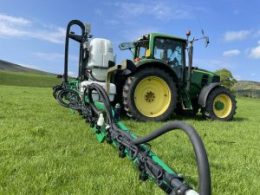European farmers are growing increasingly frustrated with the European Union’s climate policies, which they claim are threatening their livelihoods and way of life. The EU’s Green Deal, aimed at reducing greenhouse gas emissions, has been met with resistance from farmers who feel it is too ambitious and will lead to food shortages and economic instability.
The EU’s agricultural sector is a significant contributor to the bloc’s economy, and farmers are worried that the new policies will make it difficult for them to continue operating. ‘We’re not against the environment, but we’re against the way the EU is going about it,’ said a French farmer, who wished to remain anonymous. ‘We’re the ones who will be affected the most, but we’re not being listened to.’
The EU’s Green Deal includes a number of measures aimed at reducing emissions, including a ban on fossil fuel-powered vehicles and a phase-out of coal-fired power plants. While these measures are intended to reduce the EU’s carbon footprint, they are also expected to have significant economic impacts on certain industries, including agriculture.
Some farmers are already feeling the effects of the new policies, with many reporting that they are struggling to make ends meet. ‘We’re seeing a lot of farmers who are having to sell their farms because they can’t afford to keep them going,’ said a German farmer. ‘It’s a tragedy.’
The EU’s agricultural sector is also facing other challenges, including a decline in the number of young people entering the profession and a lack of investment in rural areas. The combination of these factors is making it difficult for farmers to remain viable, and many are calling for the EU to rethink its approach to agriculture.
Despite the challenges facing the agricultural sector, there are also opportunities for farmers to adapt to the changing climate. ‘We need to be more sustainable and more efficient,’ said a Dutch farmer. ‘We need to find ways to reduce our emissions and protect the environment.’
The EU’s Green Deal is not the only challenge facing farmers, however. The bloc is also facing a number of other environmental and economic challenges, including a decline in biodiversity and a lack of investment in rural areas. The combination of these factors is making it difficult for farmers to remain viable, and many are calling for the EU to rethink its approach to agriculture.
In the meantime, farmers are continuing to adapt to the changing climate and to find ways to reduce their emissions. ‘We’re not going to stop farming just because of the climate,’ said a Spanish farmer. ‘We’re going to find ways to make it work.’
The EU’s agricultural sector is a significant contributor to the bloc’s economy, and farmers are worried that the new policies will make it difficult for them to continue operating. ‘We’re not against the environment, but we’re against the way the EU is going about it,’ said a French farmer, who wished to remain anonymous. ‘We’re the ones who will be affected the most, but we’re not being listened to.’









